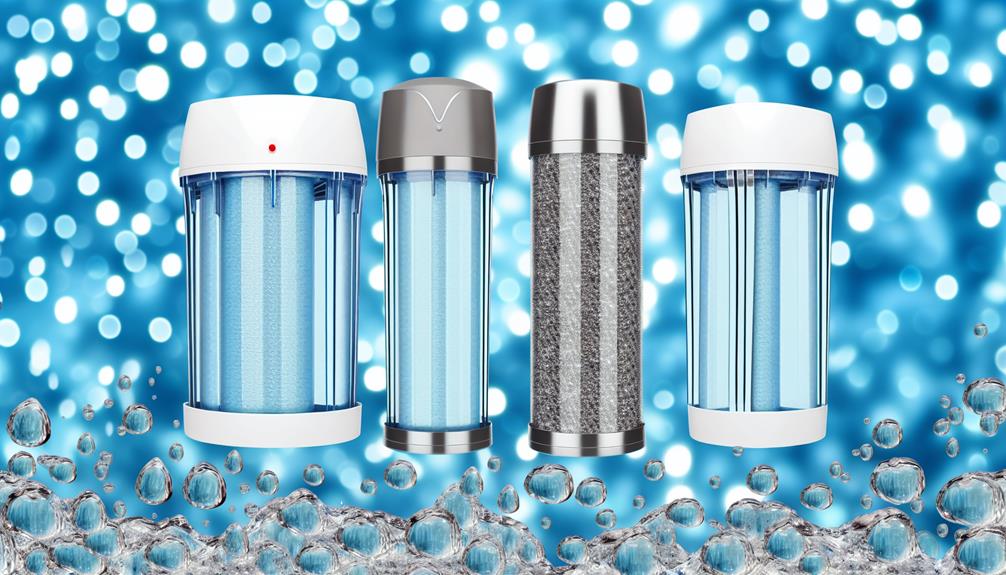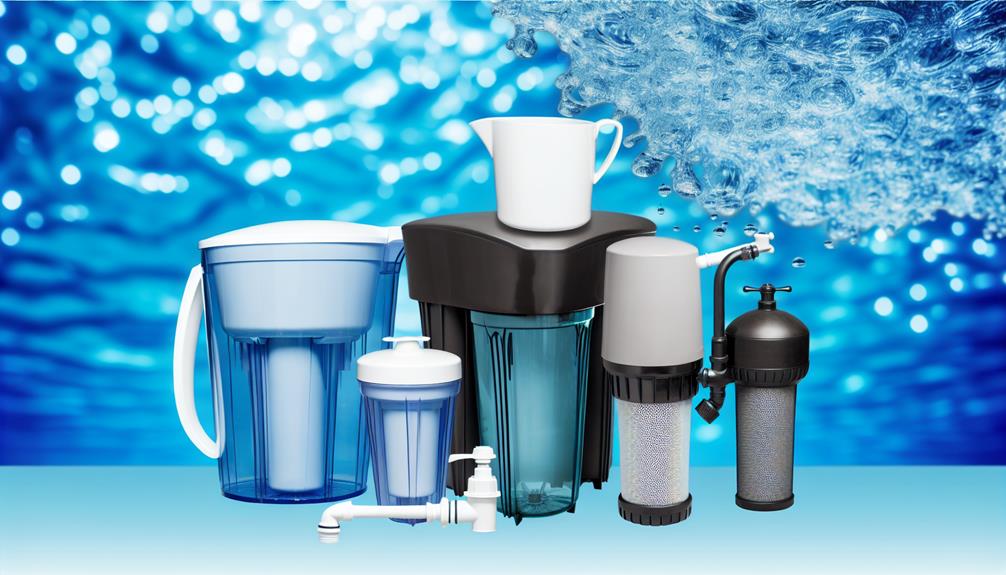Just when you thought your budget couldn't accommodate the necessary safeguard against arsenic-contaminated water, you'll find that you're not without options.
You're likely aware that arsenic in drinking water poses a serious health threat, and it's a problem that you can't afford to ignore.
Fortunately, there are several low-cost filtration systems that can effectively remove arsenic from your water supply. From pitcher filters specially designed to reduce arsenic levels to DIY sand and charcoal filtration methods, you have a range of choices that won't break the bank.
The question is, how do these systems compare in terms of effectiveness, ease of use, and maintenance? And more importantly, which option will suit your specific needs best?
Let's explore the available technologies that are both accessible and affordable, ensuring you can provide safe drinking water for your household without incurring a financial strain.
Pitcher Filters With Arsenic Reduction
Pitcher filters with arsenic reduction provide an economical and straightforward method for purifying water in your home, utilizing a two-stage process to effectively eliminate arsenic and iron without the need for electricity. These water filters harness the principles of oxidation-coagulation-adsorption to target contaminants, ensuring your drinking water meets safety standards.
The process begins with oxidation, where arsenic in its more toxic form (arsenic III) is converted into arsenic V, a less hazardous state. Subsequently, coagulation allows these oxidized particles to clump together, making them larger and thus easier to filter out. The final stage, adsorption, is where the clumped arsenic is trapped and held in the filter medium, drastically reducing its concentration in the water you consume.
You'll be reassured to know that these pitcher filters can achieve arsenic reduction to levels below the stringent safety threshold of 10 parts per billion. The low recurring chemical costs, under Re 0.5 per 100 liters, make this a highly viable low-cost arsenic filtration solution.
Moreover, the simplicity of the design and the availability of raw materials amplify its suitability for widespread use in areas affected by arsenic contamination. With such filters, you're not only safeguarding your health but also ensuring access to clean drinking water without incurring substantial expenses.
Under-Sink Reverse Osmosis Systems
Under-sink reverse osmosis systems stand as a robust barrier against arsenic, using a semipermeable membrane to ensure the water you drink is significantly purified from this toxic element. When you install one of these systems, you're leveraging a highly effective solution designed for arsenic reduction, capable of also dealing with various heavy metals that can be present in your water supply.
These water filters operate on the principle of reverse osmosis, a process widely recognized for its reliability to remove arsenic. Its advantage lies in the simplicity and convenience it offers over other complex methods like precipitation, adsorption, ion exchange, and biological treatments. Unaffected by external biological or chemical factors, an under-sink system ensures consistent performance in arsenic removal.
Take, for instance, the SimPure Y7P Countertop Reverse Osmosis Water Filter Dispenser. Despite being countertop, its design philosophy aligns with under-sink systems, promising to eliminate up to 99.99% of pollutants and providing you with purified water. By choosing a system like this, you're opting for peace of mind, knowing that your water's arsenic levels are being addressed with a solution that's both efficient and unobtrusive.
Countertop Distillation Units
For individuals seeking an affordable and space-efficient solution to arsenic contamination, countertop distillation units offer a viable filtration method that's both simple to use and effective in purifying water. These compact units are particularly suitable for small households or those who prioritize portability, fitting comfortably on most counters without requiring extensive space.
Countertop distillation works by heating water to create steam, which then condenses back into liquid form, leaving behind many contaminants, including arsenic. This process significantly reduces arsenic concentration, safeguarding against arsenic poisoning—a serious health risk identified by the Environmental Protection Agency (EPA). Given that arsenic is a naturally occurring element found in groundwater, using a distillation unit can ensure that you can drink water from your tap without the fear of consuming harmful levels of arsenic.
Moreover, while Whole House filtration systems provide a comprehensive solution, they can be cost-prohibitive for some. Countertop distillation units emerge as an economically favorable alternative, demanding minimal maintenance and offering ease of operation. You'll find them to be a practical choice for ongoing water contamination issues, allowing you to access clean water for drinking and cooking with the assurance that the risk of arsenic is effectively mitigated.
Gravity-Fed Charcoal Filters
While countertop distillation units are effective in reducing arsenic levels, gravity-fed charcoal filters offer an equally efficient and more environmentally conscious method for purifying your water. These filters take advantage of a passive filtration system that relies on the natural force of gravity to draw water through activated charcoal, which is renowned for its ability to adsorb contaminants, including arsenic.
Here are some key facts about gravity-fed charcoal filters:
- High Adsorption Capacity: Activated charcoal's large surface area makes it highly effective at trapping arsenic particles.
- Ease of Use and Maintenance: These filters are simple to operate and maintain, ideal for both household and community applications.
- Eco-Friendly: They don't require electricity, reducing your carbon footprint, and generate minimal waste.
When considering gravity-fed charcoal filters, you should be aware that the flow rate may be reduced to less than that of pressurized systems. However, the trade-off is a more sustainable filtration process.
In areas with high levels of arsenic in water, these filters are a practical choice, providing an effective solution to ensure the water you consume is safe and free of harmful arsenic.
DIY Sand and Charcoal Filtration
You can create an efficient arsenic filtration system right at home using sand and charcoal, which work together to remove harmful arsenic particles from your water supply. This DIY sand and charcoal filtration method is particularly effective because it leverages the adsorptive properties of charcoal and the mechanical filtration capabilities of sand. As water passes through the layers, the presence of arsenic, including arsenic that may leach through other materials, is significantly reduced.
To ensure the system adheres to safety standards, such as those outlined in the toxicity characteristic leaching procedure, it's important to use materials that won't introduce additional contaminants. Stainless steel containers are an excellent choice for housing your filter, as they're durable and don't corrode, ensuring no competing ions are introduced into the water.
In the United States and elsewhere, arsenic contamination is a critical concern, and this DIY approach provides a practical and low-cost solution. By regularly replacing the sand and charcoal, you maintain the effectiveness of your filtration system. Staying informed about the proper setup and maintenance is key to ensuring that your DIY filtration system continues to provide you with safe drinking water.

